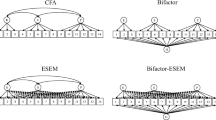Abstract
Psychometric properties of a brief self-report measure of personal loss for adults coping with psychiatric disability are examined. The Personal Loss from Mental Illness Scale (PLMI) is a 20-item measure that assesses overall perceptions and four interrelated aspects of personal loss from mental illness. Using a sample of 158 adults with serious mental illness, the PLMI was found to have a meaningful factor structure, good internal consistency and high test–retest reliability. Construct validity is evidenced by positive correlations between personal loss scores, number of psychiatric hospitalizations, self-reports of loneliness, psychological symptoms, and problems with alcohol. PLMI scores were unrelated to scores on a personal growth measure and negatively correlated with scores on a positive well-being scale. Implications of the PLMI for research on coping, adaptation and recovery from serious mental illness are discussed.
Similar content being viewed by others
References
W. R. Breakey L. Calabrese A. Rosenblatt R. Crum (1998) ArticleTitleDetecting alcohol use disorders in the serverely mentally ill Community Mental Health Journal 34 165–174 Occurrence Handle10.1023/A:1018793002740 Occurrence Handle1:STN:280:DyaK1c3otFCksw%3D%3D Occurrence Handle9620161
M. D’Andrea J. Daniels R. Heck P. Whiting (1992) ArticleTitleThe factor analytic structure of personal loss Measurement and Evaluation in Counseling and Development 25 121–132
D. J. Davis C. L. Schultz (1998) ArticleTitleGrief, parenting and schizophrenia Social Science and Medicine 46 369–379 Occurrence Handle10.1016/S0277-9536(97)00167-6 Occurrence Handle1:STN:280:DyaK1c7it1Wmsg%3D%3D Occurrence Handle9460818
P. E. Deegan (1988) ArticleTitleRecovery: The lived experience of rehabilitation Psychosocial Rehabilitation Journal 11 11–19
L. R. Derogatis N. Melisaratos (1983) ArticleTitleThe brief symptom inventory: An introductory report Psychological Medicine 13 595–605 Occurrence Handle1:STN:280:DyaL2c%2Fhs1CnsQ%3D%3D Occurrence Handle6622612 Occurrence Handle10.1017/S0033291700048017
L. A. DeSpelder A. L. Strickland (1992) The last dance EditionNumber2 Mayfield Mountain View
Farina, A. (2000). The few gains and many losses for those stigmatized by psychiatric disorders. In H. J. Harvey and E. D. Miller (Eds.), Loss and trauma: General and close relationship perspectives. Philadelphia: Brunner-Routledge.
J. H. Harvey (2002) Dissolution and divorce J. H. Harvey (Eds) Perspectives on loss and trauma: Assaults on the self Sage Thousand Oaks, CA 57–96
J. H. Harvey E. D. Miller (1998) ArticleTitleToward a psychology of loss Psychological Science 9 429–434 Occurrence Handle10.1111/1467-9280.00081
J. H. Harvey T. L. Orbuch A. L. Weber (1990) ArticleTitleA social psychological model of account-making and confiding Journal of Traumatic Stress 4 515–531 Occurrence Handle10.1007/BF00974587
P. Kelley (1998) Loss experienced in chronic pain and illness J. H. Harvey (Eds) Perspectives on loss: A sourcebook Brunner/Mazel Philadelphia 201–212
P. MacGregor (1994) ArticleTitleGrief: The unrecognized parental response to mental illness in a child Social Work 39 160–166 Occurrence Handle1:STN:280:DyaK2c3gsVOrsw%3D%3D Occurrence Handle8153758
D. Mayfield G. McLeod P. Hall (1974) ArticleTitleThe CAGE Questionnaire: Validation of a new alcoholism screening instrument American Journal of Psychiatry 131 1121–1123 Occurrence Handle1:STN:280:DyaE2M%2Fhs1yjuw%3D%3D Occurrence Handle4416585
F. Miller J. Dworkin M. Ward D. Barone (1990) ArticleTitleA preliminary study of unresolved grief in families of seriously mentally ill patients Hospital and Community Psychiatriy 41 1321–1325 Occurrence Handle1:STN:280:DyaK3M7hsFejsA%3D%3D
E. Neeld (1990) Seven choices: Taking steps to a new life after losing someone you love Delta New York
C. L. Park L. H. Cohen R. L. Murch (1996) ArticleTitleAssessment and prediction of stress-related growth Journal of Personality 64 72–105
J. Rappaport (1995) ArticleTitleEmpowerment meets narrative: Listening to stories and creating settings American Journal of Community Psychology 23 795–807 Occurrence Handle1:STN:280:DyaK2s%2FgsVSguw%3D%3D Occurrence Handle8851350
C. D. Ryff (1989) ArticleTitleHappiness is everything, or is it? Explorations on the meaning of psychological well-being Journal of Personality and Social Psychology 57 1069–1081 Occurrence Handle10.1037//0022-3514.57.6.1069
K. A. Ryan (1993) ArticleTitleMothers of adult children with schizophrenia: An ethnographic study Schizophrenia Research 11 21–31 Occurrence Handle10.1016/0920-9964(93)90034-G Occurrence Handle1:STN:280:DyaK2c7ivVKhtQ%3D%3D Occurrence Handle8297801
D. W. Russell (1996) ArticleTitleUCLA loneliness scale (Version 3): Reliability, validity, and factor structure Journal of Personality Assessment 66 20–40 Occurrence Handle1:STN:280:DyaK287ls1yhtQ%3D%3D Occurrence Handle8576833
D. Russell L. A. Peplau M. L. Ferguson (1978) ArticleTitleDeveloping a measure of loneliness Journal of Personality Assessment 42 290–294 Occurrence Handle1:STN:280:DyaE1c7ps1ChsQ%3D%3D Occurrence Handle660402
P. Solomon J. Draine (1996) ArticleTitleExamination of grief among family members of individuals with serious and persistent mental illness Psychiatric Quarterly 67 221–234 Occurrence Handle1:STN:280:DyaK28vis12rsA%3D%3D Occurrence Handle8829245
M. S. Stroebe H. Schut (2001) Meaning making in the dual process model of coping with bereavement R. A. Neimeyer (Eds) Meaning reconstruction and the experience of loss American Psychological Association Washington DC 55–76
C. H. Stein V. A. Wemmerus (2001) ArticleTitleSearching for a normal life: Personal accounts of adults with schiozphrenia, their parents and well-siblings American Journal of Community Psychology 29 725–746 Occurrence Handle10.1023/A:1010465117848 Occurrence Handle1:STN:280:DC%2BD3MrkvVaqsg%3D%3D Occurrence Handle11594697
Author information
Authors and Affiliations
Corresponding author
Additional information
This research was supported by a grant from the Ohio Department of Mental Health (99.1144) awarded to the first author. We extend our appreciation to participants in the research and to the graduate students who served as interviewers for the study.
Rights and permissions
About this article
Cite this article
Stein, C.H., Dworsky, D.O., Phillips, R.E. et al. Measuring Personal Loss Among Adults Coping with Serious Mental Illness. Community Ment Health J 41, 129–139 (2005). https://doi.org/10.1007/s10597-005-2648-7
Issue Date:
DOI: https://doi.org/10.1007/s10597-005-2648-7



